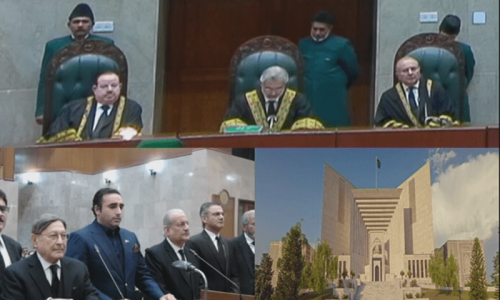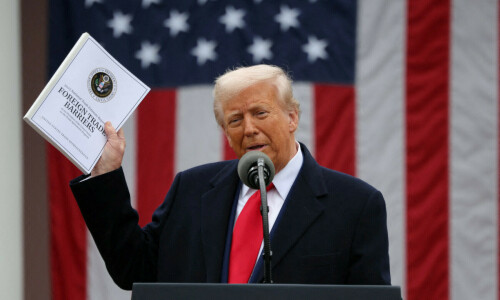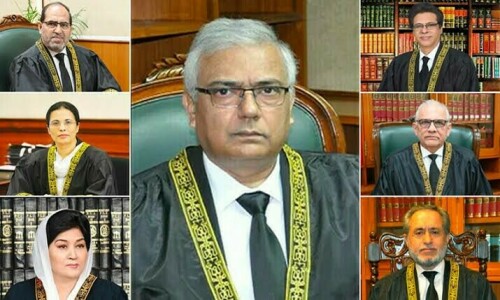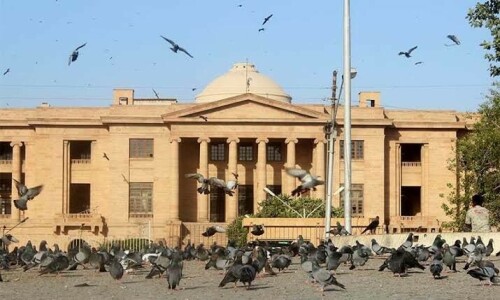ISLAMABAD: In a detailed opinion on the presidential reference in the murder trial of former prime minister Zulfikar Ali Bhutto, the Supreme Court on Monday said the trial and appellate courts that heard the cases were not true courts under the Constitution.
“The country was captive to martial law and so too were its courts,” Chief Justice Qazi Faez Isa observed, adding: “When judges take oath of allegiance to dictators, the courts are no longer of the people.”
The 48-page detailed opinion authored by CJP Isa explained why on March 6, the Supreme Court after over 44 years of delay corrected a historic wrong by holding that the trial against the former premier by the Lahore High Court (LHC) and then appellate court’s final endorsement lacked due process.
The detailed judgment came on a presidential reference to answer whether the Supreme Court could revisit its 1979 judgement that sent former Prime Minister Zulfikar Ali Bhutto to the gallows. In March 1979, nearly two years after the ouster of Bhutto’s government by military dictator Gen Ziaul Haq, a seven-judge SC bench in a four-three ruling upheld the LHC verdict of death sentence to ex-PM Bhutto.
In detailed verdict on Zulfikar Ali Bhutto reference, CJP Isa observes when ‘judges take oath of allegiance to dictators, the courts are no longer of the people’
Now in the detailed opinion, the CJP observed that admittedly, the trial against Mr Bhutto was conducted and the appeal was heard without the former premier having the constitutional protection of the fundamental rights and other rights guaranteed in the Constitution. These transgressions may have vitiated the trial and the conviction, however, cumulatively they destroyed any semblance of due process and fair trial, the opinion said.
Justice Isa observed that Gen Ziaul Haq’s unconstitutional act of imposing martial law was construed in the nature of a mandate from the people of Pakistan. It was not at all necessary, nor desirable, to state how popular he was by the appellate court since it was not for the Supreme Court to measure populism, nor what it entailed, the CJP explained.
The CJP also regretted that the trial court, which tried and convicted Mr Bhutto, and the appellate court, which rejected his appeal, were operating when there was no constitutional rule in the country and one man’s will and whim became legislation and his person had replaced the entire democratic order.
Unfortunately, the chief martial law administrator was also adulated in another case that he ‘stepped in to save the country,’ the CJP regretted, adding the expression of such incredulous admiration undermined the credibility of the appellate court.
“Was it not obvious that Gen Ziau lHaq would be the direct beneficiary of a guilty verdict. If Mr Bhutto was acquitted he may have proceeded to prosecute Gen Ziaul Haq for the crime of high treason. Gen Zia’s personal survival depended on Mr Bhutto being found guilty,” he said, adding the continuation of usurped power required Mr Bhutto to be convicted.
The detailed judgement regretted that bias was on display in a number of paragraphs of the trial court judgement.
“Gratis observations were made which had absolutely nothing to do with the case before the court, which was, whether Mr Bhutto had conspired to order the assassination of Ahmad Raza Kasuri — the complainant.
Moreover, extraneous paragraphs were written to dishonour and disgrace Mr Bhutto by five judges of the high court (trial court) who deemed it necessary to state that, before Mr Bhutto sought “election to the office of the Chief Executive of the Federation he would order his own life in accordance with the injunctions and teachings of Holy Quran and Sunnah”.
The priggish sanctimony, with respect, did not stop here, the opinion regretted, adding the moralising continued: ’Before undertaking to observe the principles of democracy, freedom, equality, tolerance and social justice, as enunciated by Islam he should inculcate these qualities in himself.“
The opinion said that Mr Bhutto was neither on trial for corruption nor for violating the Constitution, however, judges made gratuitous remarks about these matters too by stating: “he ’treated the Constitution and the law as a source of unlimited power for himself which may satisfy his own inane craving for self-aggrandizement and perpetuation of his rule.”
Published in Dawn, July 9th, 2024















































